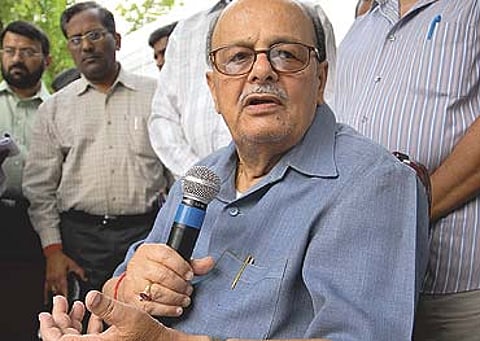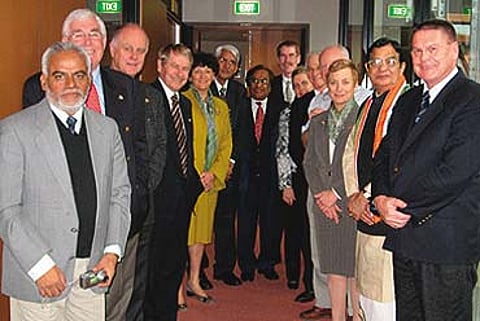Private Ivy
Higher education must harness the private sector's energies wisely
Pros
- India is facing a shortage of skilled manpower and only private colleges can reduce the mismatch
- Private sector designs courses to impart skills to students that are are required for specific industries
- India requires huge investments in higher education; only the private sector can fulfil it
- Students may prefer to study in foreign colleges in India despite their high fee structure because it will help them network globally
- Experience shows the private sector is mainly driven by profit motive at the expense of quality
- Skills-driven courses may not help students in the long run as required skill-sets keep changing
- If India adopts labour reforms, students with specific courses may find themselves unemployed
- Most foreign colleges in India are second and third-rung ones and end up fleecing the students; many don't impart any quality education
***

While the commerce ministry is keen to open doors to foreign investment, the Knowledge Commission is in favour of stronger regulatory measures.
Sam Pitroda, Knowledge Commission chief

"There are only a few hundred American scholars in India. The IITs have very good people and there should be more; some should be world-class."
Stephen P. Cohen, Fellow, Brookings Institution

"Many private bodies are only interested in making money. Only a small portion of the capitation fees are ploughed back, it's invested elsewhere."
M. Anandakrishnan, Chairman, MIDS
***

The debate about privatisation is more relevant as India plans to open up higher education for foreign universities. The Foreign Education Providers (Regulation) Bill, which has been approved by the cabinet, is likely to be placed before Parliament in the near future. At this juncture, the objections from the Left parties may result in the bill being returned to the HRD ministry for further review. Still, the floodgates will be opened up for foreign players soon.
"We definitely have to allow foreign universities. They will come and offer courses with a higher fee structure but students might prefer that actually because of the foreign linkages. We all have to gear up to face this challenge. It has not started happening for the engineering degree courses yet but it can in the next couple of years," says Kranti Kumar, principal, Thadomal Shahani Engineering College. Adds Arun Jamkar, dean, B.J. Medical College, Pune, "One of the effects of high capitation fees is the preference for getting a global degree with the same or less amount. Thus, foreign colleges coming into India are attracting students' attention."
However, critics say India should be careful in either privatising or allowing foreign universities in the higher education segment. Ravi Kumar, fellow, Council for Social Development, says that this is probably not the right way to approach the problem. "It must not be forgotten that there has been a shortage of reserve pool despite the burgeoning of private institutions. Does this mean that private institutions do not actually produce well-qualified professionals? This is something the private capital representatives need to think about," he says.
He says the focus on skills development is lopsided. "We forget that the demand for skills keeps changing. Secondly, skill development is like imparting information, which is automatically developed if you go for long-term educational goals. A blind emphasis on it is harmful in the long term because once one skill gets outdated, it would generate a new pool of unemployables. To address the issue of quality, one needs to address the aspects of improving the state of academic institutions and enhance the emphasis on pure research," avers Kumar.

The experience in several states reveals that the private sector is more often than not driven by the money-making motive, thereby sacrificing quality. Describing many private universities as 'playgrounds of politicians', Anandakrishnan says private institutions contribute to the black economy because of the huge capitation fees, often paid in cash. And only a small portion of the fees is ploughed back into the institutions with the bulk utilised elsewhere—in real estate or funding politicians, many of whom own and run several private colleges.
In many cases, the so-called collaboration with foreign institutions has been used to merely lure students who are left with certificates or diplomas that are recognised neither in India nor in any other country. Studies have revealed that around 50 per cent of foreign universities and institutions in India are worthless, as they are not recognised in their own countries. "Of the remaining 50 per cent, not even one per cent are first-tier institutions," says an education expert.
Explains Girish Rangan, country manager, U21 Global, an online university for corporate education, "Many institutions in India claim tie-ups with foreign institutions and universities. But most of these foreign institutions are unknown and only sound foreign. What one needs to understand is that big foreign institutions/universities will never tie up with just any college. They adopt stringent measures for having an academic partnership. They are very conscious of the fact that the wrong ones would affect their branding and, therefore, have a very cautious approach."

Most experts say that private initiative can only work in an environment that has a strong regulatory mechanism. For example, private institutions in the US are either governed by a neutral board of eminent people in the case of 'not for profit' Harvard, Yale, Princeton and Stanford, or treated as commercial ventures in case of 'for profit' ones. But both have a set of rules governing them. Sadly, this is not the case in India, where there is neither regulation nor accountability.
In India, private institutions are registered as charitable institutions for tax purposes and don't report to any independent authority on issues like fees or quality of the courses. This is despite a Supreme Court directive to the states to have fee fixation committees to monitor private colleges. This has resulted in making higher education an elitist privilege because of the expense involved. Apart from the fees, private colleges collect capitation fees, which can be Rs 45 lakh or more for medicine, and Rs 5-15 lakh for engineering and dentistry under the so-called management quota.
Between the commerce ministry's keenness to open doors to foreign investment, and the desire of the PM-appointed Knowledge Commission, headed by Sam Pitroda, to strengthen the regulatory mechanism, several experts favour a mid-course. "Between the two, we should adopt the Singapore model that requires foreign institutions to have a minimum rating in their own country," opines Anandakrishnan.
At the end of the day, it must not be forgotten that ultimately it is higher education, especially research, which generates knowledge. Graduate and undergraduate courses either disseminate knowledge that already exists or offer training grounds for students to develop a taste for nurturing knowledge. What is happening today is that 'knowledge' has been substituted by 'information' across institutions and that has impeded the growth of knowledge.
"Unfortunately, authorities too are seeing vocational training and technical education streams as a means to address the issue of unemployment. In the long run, unless basic higher education in pure sciences, social sciences, and liberal arts, which teach people to question and use their critical thinking faculty, is not encouraged, the bulk of our population will be sophisticated mechanics and technicians and not engineers and scientists," concludes Rajni Palriwala, sociology department, Delhi School of Economics.
Tags